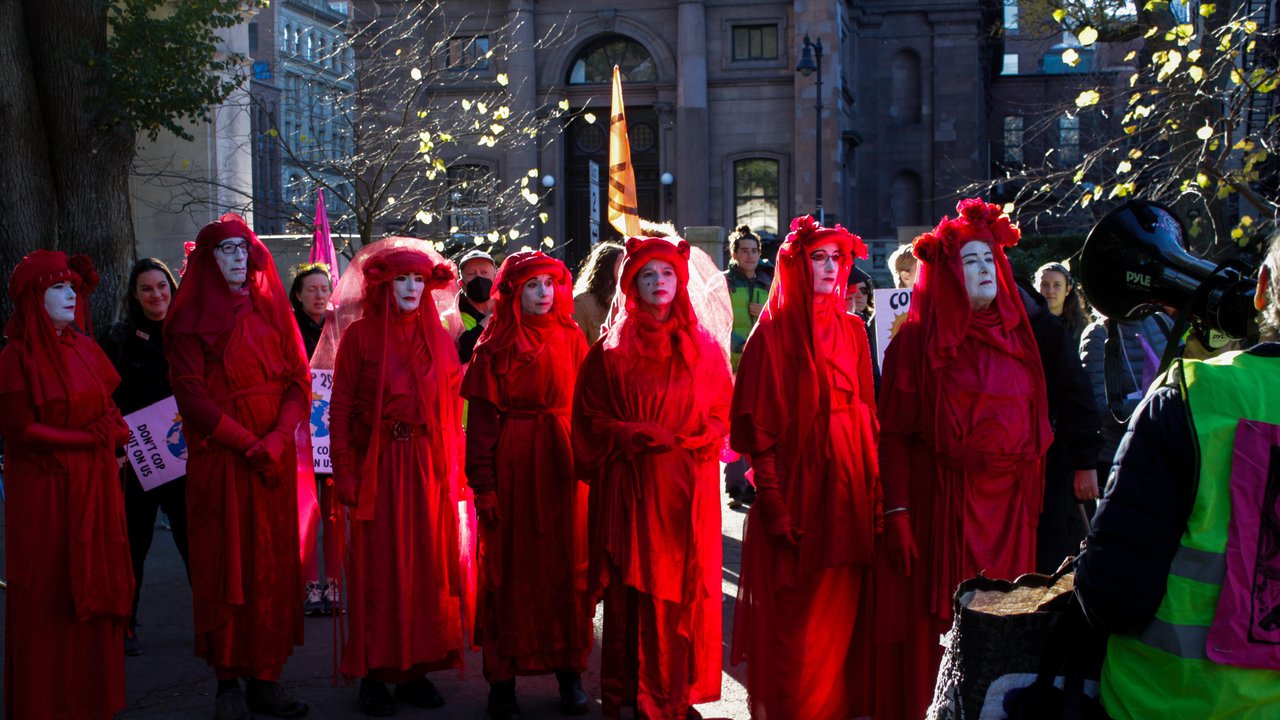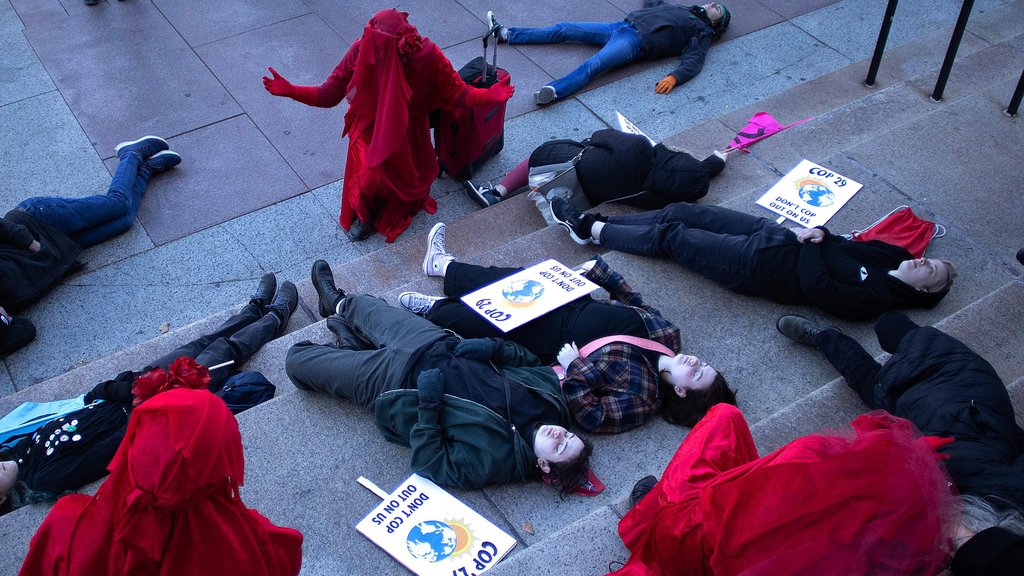
COP29: The Unfolding Drama
The 2024 United Nations Climate Change Conference or Conference of the Parties of the UNFCCC, more commonly known as COP29, is the 29th United Nations Climate Change conference. COP29 was held in Baku, Azerbaijan, from November 11 through November 22. The location itself was a controversial choice, as Azerbaijan is a major oil and gas producer. After last year's COP was held in Dubai, United Arab Emirates, it seems that the COP organizers are committed to legitimizing petro-states as "climate leaders."
Even before it began, COP29 was under serious scrutiny by activists worldwide. On Saturday November 9, XR Boston's Red rebel troupe partnered with the UK Red Rebels to facilitate a series of Die-Ins around the Boston Public Gardens and Newbury Street, protesting the inevitable failure of the conference. On November 11, climate activist Greta Thunberg attended a rally in Tbilisi, the capital of Georgia, to protest Azerbaijan's hosting. Thunberg and other activists criticized Azerbaijan's repressive government, and use of the summit to "greenwash" human rights abuses. She called it "absurd" to hold climate talks in an "authoritarian petrostate" amid rising emissions and a climate crisis.
During the lead-up to the conference, COP29 became known as "the finance COP" because of the focus on operationalizing the Loss and Damage Fund to support vulnerable communities. According to the World Resources Institute, "For the first time in 15 years, representatives from all countries in the world will come together to set a new global climate finance target." This global finance target relies heavily on wealthier nations, who are also the leading sources of carbon behind the climate crisis. Before the conference began, WRI announced, "While estimates vary widely (due to the models and inputs they use), most find that developing countries, after deploying their own resources, will need an additional $500 billion to $1 trillion per year in climate finance from international sources. That's at least 5 times as much as the current $100 billion commitment."
As the conference drew closer, EU diplomats criticized Azerbaijan for not putting fossil fuel phaseouts on the agenda, solely focusing on mitigation. Foreign minister Justin Tkatchenko announced in October 2024 that Papua New Guinea would boycott the summit, calling it and previous COP summits a "total waste of time".
Further damaging the reputation of the conference, COP29 Chief Executive, Elnur Soltanov was secretly recorded discussing potential oil and gas deals, raising concerns about a breach of COP ethics. Critics argue this undermines the conference's goal of transitioning away from fossil fuels, as Soltanov also holds a key role in Azerbaijan's energy sector. However, Soltanov was not replaced as the Chief Executive.

What happened on Friday November 22?
Friday November 22 was slated to be the final day of the conference. However, after the "rich world countries" presented an offer of draft text of an agreement to finance only $250 billion to help developing nations tackle the climate crisis, the recipient countries responded with indignance and frustration.
According to the International Institute for Sustainable Development, "At 3 pm the venue suddenly erupted into frantic chatter as delegates examined the new drafts. The disappointment was palpable." Juan Carlos Monterrey Gómez, Panama’s climate envoy, told the Guardian: “This is definitely not enough. What we need is at least $5tn a year, but what we have asked for is just $1.3tn. That is 1% of global GDP. That should not be too much when you’re talking about saving the planet we all live on.” Monterrey continued, "It feels that the developed world wants the planet to burn." To clarify, $250 billion is less than 20% of $1.3 trillion, a significant shortcoming.
From the opposition, a European negotiator told Reuters that the same proposal was uncomfortably high and did not do enough to expand the number of countries contributing to the funding. "No one is comfortable with the number, because it's high and (there is) next to nothing on increasing contributor base," the negotiator said. However, analysts say that, for the contributors, the $250 billion target would require only a modest increase from what they are already spending on climate finance. "Without much of a lift, developed countries should be able to meet that amount by 2030," said David Waskow, director of the international climate initiative at the World Resources Institute. Those contributing countries would include the EU, Australia, the United States, Britain, Japan, Norway, Canada, New Zealand, and Switzerland.
Reuters reported, "Showing some progress late on Friday, the COP29 presidency released what it hopes will be a final deal for resolving rules around carbon markets. But world governments at the U.N. climate summit were still working into the night on the contours of a sweeping funding plan to tackle climate change." The International Institute for Sustainable Development reports, "There’s still much to settle, from the scale of funding to questions about responsibility: who contributes, and what exactly will the finance cover?"
Previous COPs have also run over time, so this isn't unprecedented. Discussions are expected to continue on Saturday November 23. By the time you're reading this, hopefully large progress will have been made. We recommend that you follow The Guardian's ongoing coverage to hear about further developments.
Featured:
-
The third annual Week of Rebellion is full of opportunities for celebration and action!
-
Our government had the opportunity to finally turn our state into a "climate leader," and they decided yet again to prioritize profits and political posturing over the well-being of residents.
-
Prominent climate scientists and activists demand immediate climate action in the United States.
-
Stop the Fossil Fuel Industry, Now: List of events for Extinction Rebellion Boston's September week of rebellion
-
A compilation of books, movies, articles, and ways to take action to protect Black lives
-
Nadia Colburn, PhD and member of Extinction Rebellion Media team, discusses how to talk about the climate and ecological crisis with family and friends.
Upcoming Events:
-
Mon Jan 19th @ 1 p.m.
-
Sun Jan 25th @ 4 p.m.
-
Tue Jan 27th @ 6 p.m.